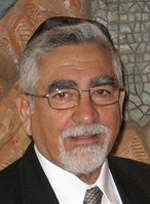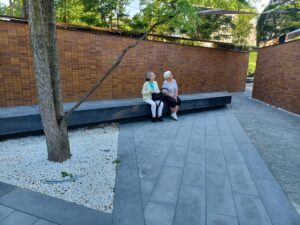By Dorian de Wind

AUSTIN, Texas —It was only 30 years ago that I learned I had close relatives in Belgium and the Netherlands, most of them Jewish, all with deep Jewish roots.
As I got to know my Dutch de Wind (previously Levy) relatives better, I learned of the horrors so many de Wind family members experienced during the Holocaust, especially the Dutch branch of the family.
From a comprehensive genealogy developed by a member of the family, I made the sad discovery that more than 120 Dutch de Winds, or immediate de Wind relatives, had been murdered by the Nazis at their sinister death camps.
Compared to the more than 102,000 Dutch Jews who were murdered during the Holocaust, 120 may not seem that many until one realizes the name de Wind is quite an uncommon family name in the Netherlands and that it represents significant portions of two de Wind generations.
As I got to know my Dutch family better, I learned more details about their parents’ and grandparents’ harrowing experiences during the Nazi occupation of the Netherlands.
One of those tragic stories was told to me about a decade ago by a newly found cousin, Loekie de Wind, who lives near Amsterdam.
Loekie’s Jewish father, Louis de Wind, was arrested during a razzia (raid) in the summer of 1944 and was transported to Westerbork, a miserable camp in the Netherlands that served as a transit point for Dutch Jews before they were deported to Nazi vernietigingskampen (extermination camps).
On September 3, 1944, Louis boarded what is reportedly the last of the infamous “Holocaust trains,” destination Auschwitz.
About a decade ago, I wrote about what Loekie’s father did while in the doomed, cramped cattle car (many of these train wagons were used to carry both freight and cattle) hurtling toward the German border and taking him and hundreds of other human beings away from their homeland, away from their homes, away from their loved ones, to a near-certain death in a distant Nazi gas chamber.
This is part of that story:
As the long freight train leaves the Nazi Westerbork transit camp and picks up speed across the flat Dutch countryside, Louis takes out the couple of sheets of paper he had stuffed in his pocket and begins to write his letter. He knows he must hurry: It will not be very long before the train crosses the border into Germany.
Writing in Dutch, he starts:
Darling,
I am on my way to an unknown destination. I sit here with 56 people in a freight car. I have to write on my knee while we are riding …
Louis finds it difficult to write, for it is very dark in the sealed freight wagon.
Still not knowing how close to the border the train is — his growing anxiety reflected in his worsening handwriting — Louis hastily ends the letter with words of hope, that, “God willing,” he will see his loved ones again; with words of love, “a thousand kisses;” and with a request to his wife: “Omhels Loekie.” (“Give Loekie a hug.”)
Louis de Wind then quickly puts the two-page letter into an envelope, addresses it to his wife, Elizabeth de Wind, and, through a slit in the door of the train that is taking him and a thousand other doomed Dutch Jews to some sinister destination, pushes the letter out of the wagon, hoping that someone will find it and send it to his wife.
Miraculously, someone found the letter in a field along the railway tracks and mailed it to Loekie’s mother. On the back of the envelope were only the words, “fallen out of the train” and the name of a small town in the Dutch province of Drenthe, Koekange.
Loekie, then only 6, would never see her father again and did not see the letter until she turned 21.
In 1949, Loekie’s mother was told by the Dutch Red Cross that “It must be assumed that Louis de Wind died as the result of illness, exhaustion or ‘gassing.’”
In later years, Loekie would learn that her father may have died during the horrific “death marches” the Jewish survivors were subjected to in the cruel winter of 1944-1945, when the Nazis attempted to move their prisoners out of Auschwitz as the Allies approached.
At the time I wrote “the letter story,” Loekie told me, “The most terrible thing of all is that I am still sad about my father and that I don’t have a place to mourn at his grave.”
But today, 12 years later, Loekie does have a place to mourn her father.
In September 2021, the Holocaust Namen Monument (Holocaust Names Memorial) designed by famous architect Daniel Libeskind was dedicated in Amsterdam. It honors the more than 102,000 Dutch Jewish (and Roma and Sinti) victims of the Holocaust who were “not given a proper burial.”

It is an austere yet solemn and emotive labyrinth of six-feet-tall walls consisting of of more than 102,000 bricks, each inscribed with the name, date of birth and age of death (one as young as one month) of a Nazi victim. “A place where survivors can remember their loved ones… a lasting warning to humanity about the drastic consequences of racism and discrimination.”
During a recent visit to the Netherlands, my family and I visited the Namen Monument.
Our attention turned to the de Wind victims. One of them, Loekie’s father, Louis de Wind.
As we approached the section of the wall with the de Wind family names, we noticed two young men pointing at one of the bricks. We asked them which brick they were looking at. It was the brick honoring Louis de Wind (below).
To our amazement, the two young men turned out to be the grandson and great-grandson of Louis de Wind, Menno and Jurriaan de Bont Hisschemöller.
Our family had traveled 5,000 miles and — unbeknownst to them or to us – we met Louis’ grandson and great-grandson at the exact instant in time and at the exact place on the globe where Louis de Wind is memorialized.
A sign from above?
An extraordinary coincidence?
I discovered that there is no single word for “coincidence” in Hebrew.
Quora.com enigmatically asks the following:
While the Hebrew language had no word for coincidence, can it be accurately assumed that any coincidence would be interpreted as a miracle?
Let us leave it at that.
*
Dorian de Wind is a retired U.S. Air Force officer and a writer. This article appeared initially on The Moderate Voice website, with which San Diego Jewish World trades stories under auspices of the San Diego Online News Association.